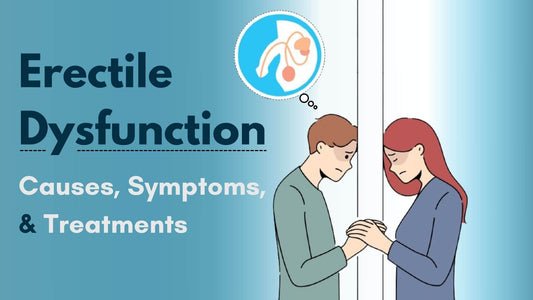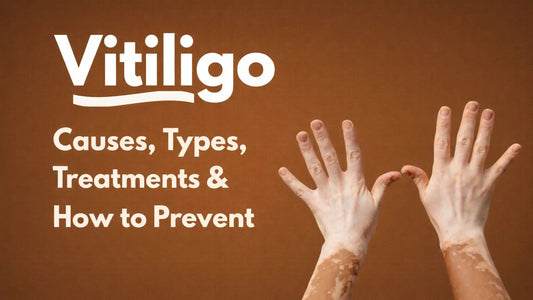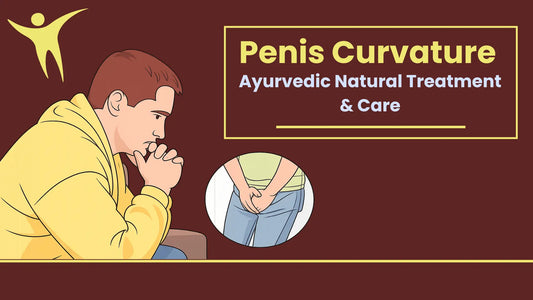
What is Erectile Dysfunction (ED)? Causes, Symptoms, and Treatments
In our fast-paced world, we encounter various positive and negative effects on health, and erectile dysfunction (ED) is one of the growing concerns. While ED has long been a known issue, it has increasingly become a major problem in India.
Currently, 1 in 10 Indian men experiences impotence, with the rate rising in metro areas. Notably, 25% of ED cases now affect individuals under 30, a significant increase from just 5-7% a decade ago.
In this blog, we will talk about erectile dysfunction (ED)— and its causes, symptoms, diagnosis, treatments, researches and Ayurvedic solutions.
What is Erectile Dysfunction?
Erectile Dysfunction (ED) is the condition that may not allow any male to sustain the erection enough to gain intercourse pleasure.
The individual undergoing such a condition may be in his 30s or 60s due to a lack of proper diet, exercise, genetic reasons, or dependency on alcohol and cigarettes.
The condition may bother the person for a short time, and if it is for a longer time, it might lead him to reproductive incompetence.
Causes of ED
Determining the causes behind ED will help in selecting the right form of treatment. Let’s understand the physical and psychological causes of ED:
Physical causes of ED
- Hardening of the artery and leakage from the vein may cause ED.
- Increasing age tends to cause slower metabolic activities, so fats collect in the body, leading to obesity or being overweight.
- Unhealthy fats interrupt the flow of blood throughout the body, weakening the erection.
- High blood sugar levels or diabetic conditions followed by weak cardiovascular conditions and high cholesterol levels damage the tissues connected with the veins.
- High blood sugar damages the nerves connecting to the penis, hampering the erection.
Psychological causes of ED
- The Oxytocin hormone tends to produce good feelings, while the cortisol hormone induces negative emotions like depression, anxiety, fear, trauma, and discomfort.
- Negative emotions deprive the man of confidence and hinder sexual performance.
Prescription Medications Causing ED
To deal with serious illnesses like diabetes, cardiovascular issues, nerve disorders, and mental disorders, many of us are prescribed strong medicines.
Such medicines happen to cause different side effects in the body, including sexual life interruptions.
Symptoms of ED
- Difficulty in getting an erection: The man finds it hard to achieve an erection even after getting aroused.
- Early ejaculation or discharge: The person fails to keep an erection longer and suffers from quick discharge of semen.
- Lack of sexual interest: Some men may not have feelings of sex and may not get aroused.
- Softer erections: A hard penis leads to greater intercourse pleasure. If the erection is not firm, one would be deprived of getting ultimate pleasure.
Risk Factors for ED
- Diabetes type 2: Increasing blood sugar causes clogged blood vessels and nerves. As a result, the circulatory system is affected, reducing the strength or stamina for erection.
- Try Dr. Madhu Amrit or Ayush 82 to control your diabetes.
- Prostate issues: Abnormality in the prostate gland in the form of prostatic hyperplasia may raise the problem of weak erections.
- High blood pressure and cardiovascular issues: Clogged blood vessels due to high blood sugar delay or slow blood flow to the penis, causing erection issues.
- Consumption of alcohol and smoking: Alcohol hinders testosterone production by disrupting brain function. Smoking chemicals damage the tissues surrounding the penis.
- Try Addiction Killer Powder or Addiction Killer Liquid to get rid of alcohol or smoking addiction.
- Nerve damage in the penile area: Nerves connecting to the penis get injured, causing damage to blood flow in the penile area.
Diagnosis and Treatment of ED
Many people hesitate to meet a doctor about ED, but discussing it is important for sexual health. By determining the medical and sexual background, the doctor can conclude the specific treatment for ED.
Diagnosis
- Physical analysis: Verifying the condition of your penis and related testes.
- Blood check analysis: A blood check will help analyze if blood sugar and other sicknesses have weakened the blood vessels.
- Urine check: Verifies the underlying conditions of ED, such as high blood sugar and high cholesterol.
- Ultrasound test: A device is used to examine blood vessels causing erection, with the doctor verifying the condition through screen images.
Ayurvedic Medicine for ED
Ayurvedic Medicine for ED have been trusted for 5,000 years for treating impotence, low sperm count, and low testosterone and are now regaining popularity. Natural herbs like Ashwagandha, Cinnamon, Shilajit, Kaunj Beej, horny goat weed, saffron, shatavari, ginseng, and safed musli are effective ayurvedic herbs that may help address ED.
Alternatively, you can use Liv Muztang or Ayush for Men for ED. These can also boost testosterone levels, sperm count, and improve male sexual health.
Over-the-counter Treatments for ED
Supplements like L-arginine and Cialis, combined with pine bark extract, are used for ED treatment. You can also get topical cream to enhance blood flow in the penis.
Prescription Medications for ED
Allopathy medicines like Sildenafil, Vardenafil, and Avanafil can manage ED but may cause side effects. Consult a doctor to avoid health issues.
Other Aspects for ED Management
Other aspects such as consuming African Mulondo, Avoid alcohol and smoking, do exercises like Kegel exercises, and maintain a healthy diet. Include fish, vegetables, and high-protein dry fruits in your diet.
Surgical Treatments for ED
- Penile implants and vascular surgery are for those unresponsive to other treatments.
- Penile revascularization by microsurgery enhances blood flow to the penis.
- Venous leakage surgery removes affected veins to control blood leakage.
New Research and Treatments for ED
- Melanocortin activators: A drug administered through the nasal cavity for mild ED symptoms.
- Gene Therapy: Investigates bioactive components that harm penile tissue, but still awaits legal approval.
- Stem cell therapy: Replaces damaged cells in the penis, but it can be costly.
- Platelet-rich plasma therapy: Renews cells in the penis for stronger erections.
- Shockwave therapy: Heals blood flow in the penile area, though more clinical data is needed.
ED and Relationships
It can be difficult to face and talk about ED with your partner. However, communication can improve both the relationship and overall health.
Discuss the issue in a private and comfortable setting, allowing your partner to express her feelings. Together, you can search for the urologist and treatment.
Conclusion
Most men deal with erection problems at some point in their lives. Several factors, such as age, chronic illness, diet, and lifestyle habits like alcohol consumption, may contribute.
Seeking the right medical support and open communication with your partner can help address the problem and improve sexual health.

Dr. Meghna
Dr. Meghna is a skilled General Ayurveda Physician, full of passion and devotion for integral health that can be seen through work. She has expertise in both men's and women's health and focuses more on infertility and sexual health disorders. She brings together the ancient Ayurvedic practice and modern wellness approaches for effective holistic treatment of patients.



